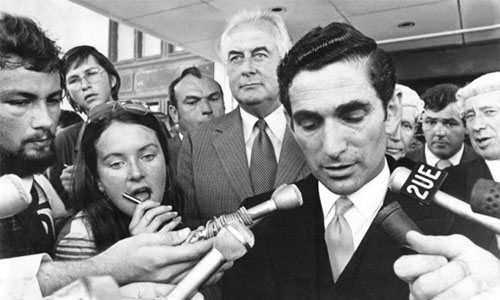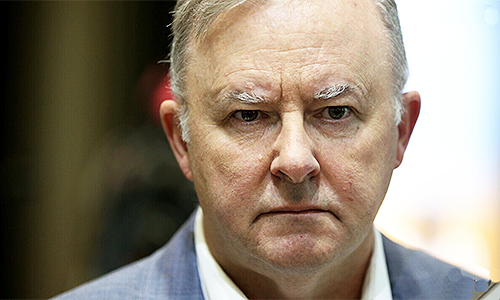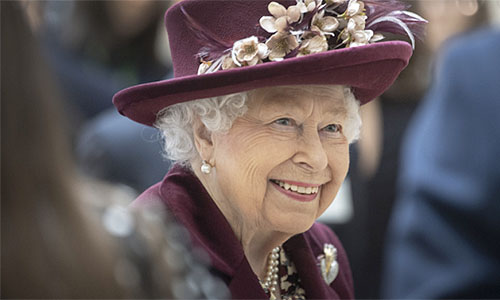
THE republican movement is in disarray. It is split several ways: whether to promote an elected or appointed president with or without reserve powers, whether to campaign against the Queen, whether to campaign on a single fake issue and most importantly, those who are dismayed by all this and demand a more serious approach.
The latter are led by the grand vizier of the Nineties republican campaign, Paul Kelly. Enthroned on a powerful bandwagon and with all the mainstream media rendering dutiful obeisance, most of the politicians had either clambered abroad or kept their heads well under the parapet. Only the brave honoured their oaths of allegiance.
LANDSLIDE
Forget 1975 as a casebook for change. Kerr did exactly what the constitution prescribed and Whitlam reiterated in 1970 (when Labor was trying to block supply). And while all demand a republic, twenty years after the “No” landslide, where are the detailed amendments? And how will they significantly improve governance?
Over a decade ago at a debate at Sydney’s Trades Hall, I revealed that not only had I been a union delegate there but that just before he was sacked in 1932, Premier Jack Lang hid there a fortune in cash drained from State government accounts. Lang even considered arresting the governor, a view similar to that of Indonesian dictator Suharto who asked, an excited Paul Keating once reported, “Why didn’t Whitlam have Kerr arrested?”
As to the debate, the other member of the “No” team was Jai Martinkovits, successor to Tony Abbott, Kerry Jones and Thomas Flynn as Australians for Constitutional Monarchy’s then and current executive director. ACM neither changes its director every couple of years as the Australian Republican Movement does, nor its reasons for opposing the ARM’s sole justification for massive constitutional change, to obtain an Australian as head of state. We already have an Australian as head of state, the governor-general. Even Malcolm Turnbull agrees.
The ARM recently publicised a poll which asked, as Paul Keating once proposed, a trick question: whether respondents want an Australian as head of state. Calling their bluff, ACM said it would advise a “Yes” vote. Just before this, the ARM ignored a YouGov poll predicting the death of republicanism – only one third of young Australians want a republic.
EXPLODED
Returning to the 2009 debate, Professor George Williams and the current “shadow assistant minister for the republic” (previously for “an Australian head of state”), Matt Thistlethwaite, spoke for the “Yes” case.
When the Palace Letters exploded, the ARM’s long and unbelievable obsession that the Queen was implicated in the sacking of Gough Whitlam – something which neither Whitlam nor any serious observer believed – Thistlethwaite and Shadow Attorney-General and Queen’s Counsel Mark Dreyfus seem not to have read the letters. Only this can explain their bizarre accusation that the Queen advised “the governor-general on how to remove our elected prime minister” and of not telling Whitlam “what was being planned”.
Whitlam, who later admitted to the Palace that Kerr had acted according to the Constitution, knew precisely what he had to do constitutionally. Addressing parliament in 1970 on Labor’s 170th attempt to block supply, he said that “if a money bill is defeated the government goes to the people to seek their endorsement of its policies”.
Incidentally, Whitlam telephoned me at the time of the referendum to obtain a copy of The Cane Toad Republic, which historian Professor Geoffrey Blainey said was the best book on the referendum. Whitlam added, “Of course, I’ll have to turn it to the wall in my bookshelf”.
The mainstream media usually report as undisputed fact that Kerr never warned Whitlam about the use of the reserve powers. But Kerr says they discussed them on four enumerated occasions. Whitlam denied three but accepts that at a dinner for Malaysian PM Tun Abdul Razuk, he did say, he claims flippantly, that it all depended on who got to the Palace first.
KHEMLANI
Interviewed recently by David Pellowe for goodsauce.news, I was reminded that Kerr was troubled by the legality of Whitlam’s scheme to issue bank warrants to creditors. Then there was the approval of a massive loan through an unorthodox source, Pakistani commodities trader Tirath Khemlani, at a meeting of the Executive Council of which he should have been forewarned, but was not. All of this reminded me of the Lang affair.
Kerr is also criticised for seeking advice from judges, but this was always considered proper. Indeed, Lord Wilberforce told me that his opinion and those of other senior British judges were frequently sought by the Palace.
As to his ultimate advice to hold a half-senate election, Whitlam knew this was no solution. Some state governors would be advised against issuing the writs and in any event, new State senators would not take office for eight months.
While the Queen’s former secretary, Sir William Heseltine, told both an ACM National Conference in Perth and more recently The Australian that if consulted, he would have suggested a short delay, Kerr was assured November 11 was the last day on which an election could be called in 1975.
If Whitlam was surprised by anything, it was Kerr’s courage. As he had told parliament in 1970, an election was the only solution. Otherwise why did he go back to the Lodge and have a large steak for lunch, no doubt rehearsing one of the most memorable lines in Australian history “Well may we say…”.
FAVOUR
And why did he not contact his Senate colleagues to block supply and thus stop the dissolution?
Whitlam knew Kerr had done Labor a great favour in two ways. Labor was to keep 35 seats; without the dismissal they would have been lucky to have kept half of these. Not only would it be easier to regain office, but Fraser would also be so fearful of stirring up further division, he would refrain from unwrapping many Labor policies.
1975 was a political and not a constitutional crisis. The constitution operated as Whitlam argued. The decision was with the people. What is the problem?PC












I have lived under two South African republics and witnessed many more African style republics – what sort of republic do these people want, they are not prepared to say!
French style – no thanks,
USA style – no thanks,
African style – no thanks!
so what style of republic?
Whitlam’s dismissal did not serve Australia well, turned Australians against each other, and martyred a massive spending, dysfunctional government. Whitlam had asked former G-G Paul Hasluck to stay on before making a very poor choice when selecting Kerr as Hasluck’s successor. Had Hasluck stayed on he would not have signed the loans council minutes as Kerr did, that later got that government into so much strife.
Hasluck would not have dismissed Whitlam, so forcing the then libs to pass supply. If Snedden had not forced Whitlam to an early election in 1974 there would have been an election anyway in late 1975, at which time there would have been no dissent at all when Whitlam was landslided out. The liberals only had to wait another year, when they’d have walked in anyway. Hayden the then labor treasurer had already begun to slash government spending, McClelland, the then minister for Labor and National Service, was smashing strikes, a responsible budget was produced, and a hitherto hopeless administration had finally begun to govern properly, so the justification to prematurely eject Labor was no longer there, though of course business confidence immediately improved post dismissal.
No government can govern responsibly when faced with the threat of being turfed out twice a year by a hostile senate when money bills are presented. Of course it was hypocritical of Whitlam to take the high ground in this regard when he himself had mooted throwing out the libs in 1970, utilising the same mechanism.
The best comment on the Whitlam era was made by Keating when uttering words to the following effect, ‘one of the first things that we did when later getting back in to government was to go down to the city to reassure them that the beverly hillbillies weren’t back in town’.
Fraser was obviously sensitive to the adverse reaction evoked by the dismissal, to the point of accomplishing little in 7 1/2 years despite enjoying a substantive majority in both houses. He may have achieved so much more had he but waited to achieve office in non controversial circumstances. The dismissal served Australia very badly, and had Whitlam followed Hawke’s advice and appointed Sir Richard Eggleston G-G instead of Kerr, the whole fiasco would have been avoided, Fraser probably would have governed much better later on, and we’d have all been beneficiaries.
All that said, Labor learned its lessons well, and later gave us good government for 13 years, followed by John Howard for another 12 years, all of which was wonderful for Australia, and despite the debacles of Rudd, Gillard and Turnbull, we are once again in safe hands with Morrison.
The liberal left and labor left together with the greens should form their own party, which would attract little electoral support, to so enable the pick of the liberals and cognisant labor right operatives to all afford Australians a better future, unimpeded by the climate change, Paris, and BLM brigades, and whatever other demonstrable nonsense and ideology derived from fantasia.